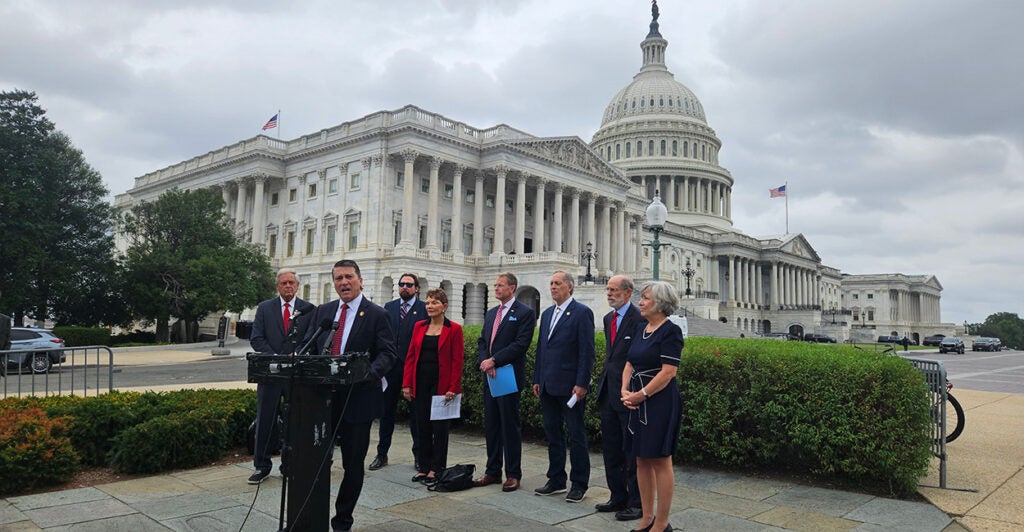UN Move Would ‘Sell Our Sovereignty to Globalists,’ GOP Lawmakers Warn
Christina Lewis /
House Republicans are standing up to what they call a push by the United Nations and its World Health Organization to extinguish U.S. sovereignty and free speech.
Reps. Ralph Norman, R-S.C., and Bob Good, R-Va., led a press conference with fellow GOP congressmen on the first day of Constitution Week to oppose ongoing initiatives of the U.N. and the WHO, one of its component organizations.
Good said the Biden-Harris administration wants America to be subordinated to and governed by the U.N. World Health Assembly and the World Health Organization.
“They seek to facilitate the evolution of the U.N. from an international cooperative body to an international governing body,” Good said at the Tuesday press conference.
Good said he is shocked by the lack of attention to the issue in the news media.
“This is the most important issue [but it’s] getting the least amount of attention relative to its importance and its impact on our country and on the American people,” the Virginia Republican said.
This weekend, the United Nations will host a conference called “Summit of the Future” to discuss three proposed international agreements: the Pact for the Future, the Declaration on Future Generations, and the Global Digital Compact.
U.N. Secretary-General António Guterres produced a report in 2021 called “Our Common Agenda,” which used COVID-19 as justification for increasing the U.N.’s power to address world crises because it wasn’t feasible to rely on member nations to do the right thing.
The Pact for the Future includes an “emergency platform” that would give Guterres the power as U.N. chief to address what the agreement calls “global shocks.”
These global shocks, the agreement says, include
large-scale climatic or environmental events that cause major socioeconomic disruptions and/or environmental degradation; future pandemics with cascading secondary impacts; high-impact events involving a biological agent (deliberate or accidental); events leading to disruptions to global flows of goods, people or finance; large-scale destructive and/or disruptive activity in cyberspace or disruptions to global digital connectivity; a major event in outer space that causes severe disruptions to one or several critical systems on Earth; [and] unforeseen risks (‘black swan’ events).
“That’s enough examples and enough reasons for them to get involved pretty much whenever and wherever they want to,” Rep. Eli Crane, R-Ariz., told reporters Tuesday.
“I hope that this body and the Senate continues to reject, push back, and stop this agreement and this push by this administration to sell our sovereignty to globalists,” Crane said.
The U.N.’s Declaration on Future Generations advocates a future free of inequality. The document says a prosperous future can be guaranteed “by eliminating the intergenerational transmission of poverty and hunger, inequality and injustice.”
The Global Digital Compact declares the U.N.’s power to regulate technology, use AI to advance “social justice,” stop misinformation and disinformation, and create standards to which everyone must adhere.
According to its Common Agenda document, the U.N. will introduce “accountability criteria for discrimination and misleading content” and promote “regulation of artificial intelligence,” or AI.
The global organization’s document states that with the internet comes the “ability to cause large-scale disinformation and undermine scientifically established facts [that] is an existential risk to humanity.”
In bold text, the U.N. document says that in defending the right to freedom of expression, societies must develop a “consensus on the public good of facts, science and knowledge.”
It isn’t clear how such a consensus would be reached without Americans handing over free speech rights to the U.N., the Republican lawmakers said.
In 2005, the 194 member nations of the WHO, the U.S. included, adopted International Health Regulations.
In 2022, after the COVID-19 pandemic, the U.S. Department of Health and Human Services proposed amendments to enable WHO Director-General Tedros Adhanom Ghebreyesus to declare an “intermediate public health alert” in any member nation. This became known as the “pandemic agreement.”
For several years now, the WHO—and Tedros in particular—has been criticized for not pressing China on its role in creating the coronavirus that causes COVID-19.
Since the WHO’s proposed pandemic agreement isn’t a formal treaty, the Biden-Harris administration’s ambassador to the world body, Linda Thomas-Greenfield, could vote to approve it without the pact’s first going through the U.S. Senate.
Last week, however, the House passed a bill (HR 1425) that would require “any convention, agreement, or other international instrument on pandemic prevention, preparedness, and response reached by the World Health Assembly to be subject to Senate ratification.” The bill still has to pass the Senate.

Kristen Ullman, president of the conservative group Eagle Forum, said she is grateful for House Republicans who are doing their constitutional duty to decide what laws Americans will live under.
“The United Nations and the WHO want to become the lawmaking body to tell us what to do,” Ullman said.
America’s sovereignty is at stake, Norman told The Daily Signal.
“It’s time for America to stand up for America and not cede our power that we rightfully have,” the South Carolina Republican said. “We’re the number one democracy in the world today, and we’ve got to protect our interests.”
